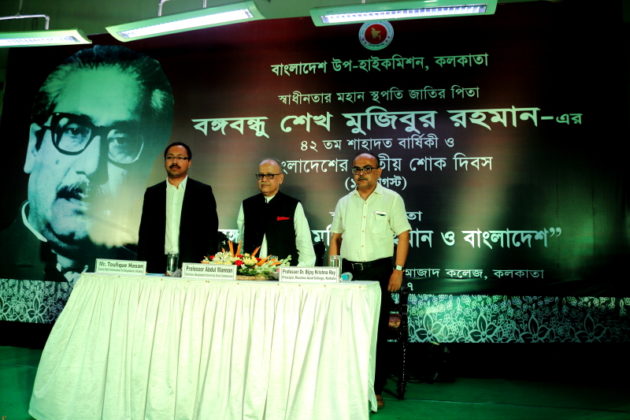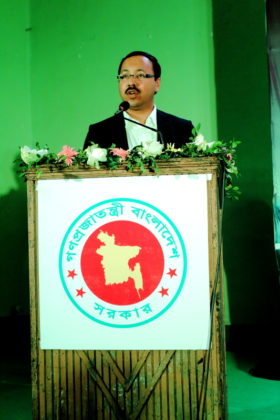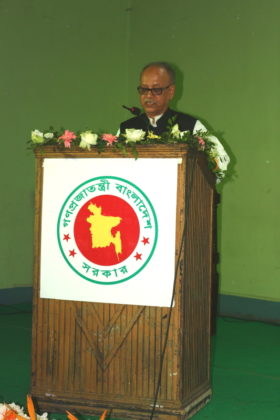Bangabandhu Sheikh Mujibur Rahman a name represents the complete Bengali ego globally as Tiger among tigers. The founder and man behind the country Bangladesh was assassinated on 15th August 1975 by conspirators.
He was not only a great freedom fighter but alos a visionary leader of Bengali aspirations and super ego.
Bangladesh Deputy High Commission at Kolkata organised a memorial lecture to make people of Kolkata understand the impact of Bangabandhu on Bangladesh and her people.
Mr. Toufique Hasan Deputy High Commissioner Bangladesh at Kolkata,Prof. Abdul Mannan Chairman University Grant Commission Bangladesh and Principal of Moulana Abul Kalam Azad College Shri Bijoy Krishna Roy were among the speakers on the occasion.
Each and everyone in the hall felt the warmth and personal touch from the speakers. In this same college Bangabandhu was student in his college days.
A documentary has been showed to the people on life and works of Bangabandhu Sheikh Mujibur Rahman during the session.
About
Sheikh Mujibur Rahman (Bengali: শেখ মুজিবুর রহমান; Bengali pronunciation: [Shekh Mujibur Rôhman]) 17 March 1920 – 15 August 1975) was a Bengali politician and Statesman. He served as the First President of Bangladesh later Premier from March 1971 untill his assassination in August 1975 .
He is considered as the driving force behind the Independence of Bengal .Rahman is popularly known as the Bangabandhu – or The Friend of Bengal. Sheikh Mujibur Rahman is credited as the central figure in Bangladesh’s liberation movement and is considered the founding father of Bangladesh. He was the leader of the Awami League. His daughter Sheikh Hasina is the current Prime Minister of Bangladesh.
An advocate of socialism, Rahman rose to the ranks of the Awami League and East Pakistani politics as a charismatic and forceful orator. He became popular for his opposition to the ethnic and institutional discrimination of Bengalis in Pakistan, who comprised the majority of the state’s population.
At the heightening of sectional tensions, he outlined a 6-point autonomy plan and was jailed by the regime of Field Marshal Ayub Khan for treason. Rahman led the Awami League to win the first democratic election of Pakistan in 1970.
Despite gaining a majority, the League was not invited by the ruling military junta to form a government. As civil disobedience erupted across East Pakistan, Rahman announced the Bangladeshi struggle for independence during a landmark speech on 7 March 1971.
On 26 March 1971, the Pakistan Army responded to the mass protests with Operation Searchlight, in which Prime Minister-elect Rahman was arrested and flown to solitary confinement in West Pakistan, while Bengali civilians, students, intellectuals, politicians and military defectors were murdered as part of the 1971 Bangladesh genocide. After Bangladesh’s liberation, Rahman was released from Pakistani custody and returned to Dhaka in January 1972.
Rahman became the Prime Minister of Bangladesh under a parliamentary system adopted by the new country. His government enacted a constitution proclaiming socialism and secular democracy. The Awami League won a huge mandate in the country’s first general election in 1973. However, Rahman faced challenges of rampant unemployment, poverty, and corruption. A famine took place in 1974.
The government was criticized for denying constitutional recognition to indigenous minorities and human rights violations by its security forces, notably the National Defense Force para militia. Amid rising political agitation, Rahman initiated one party socialist rule in January 1975. Six months later, he and most of his family were assassinated by renegade army officers during a coup. A martial law government was subsequently established.
In a 2004 BBC Bengali opinion poll, Rahman was voted as the “Greatest Bengali of All Time”.

























